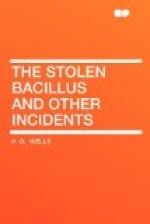“Prices ruled high next day all the same. The fact that now there were four chances instead of five of course caused a rise. The blessed birds averaged 227, and, oddly enough, this Padishah didn’t secure one of ’em—not one. He made too much shindy, and when he ought to have been bidding he was talking about liens, and, besides, Potter was a bit down on him. One fell to a quiet little officer chap, another to the little Jew, and the third was syndicated by the engineers. And then Potter seemed suddenly sorry for having sold them, and said he’d flung away a clear thousand pounds, and that very likely he’d draw a blank and that he always had been a fool, but when I went and had a bit of a talk to him, with the idea of getting him to hedge on his last chance, I found he’d already sold the bird he’d reserved to a political chap that was on board, a chap who’d been studying Indian morals and social questions in his vacation. That last was the three hundred pounds bird. Well, they landed three of the blessed creatures at Brindisi—though the old gentleman said it was a breach of the Customs regulations—and Potter and Padishah landed too. The Hindoo seemed half mad as he saw his blessed diamond going this way and that, so to speak. He kept on saying he’d get an injunction—he had injunction on the brain—and giving his name and address to the chaps who’d bought the birds, so that they’d know where to send the diamond. None of them wanted his name and address, and none of them would give their own. It was a fine row I can tell you—on the platform. They all went off by different trains. I came on to Southampton, and there I saw the last of the birds, as I came ashore; it was the one the engineers bought, and it was standing up near the bridge, in a kind of crate, and looking as leggy and silly a setting for a valuable diamond as ever you saw—if it was a setting for a valuable diamond.
“How did it end? Oh! like that. Well—perhaps. Yes, there’s one more thing that may throw light on it. A week or so after landing I was down Regent-street doing a bit of shopping, and who should I see arm-in-arm and having a purple time of it but Padishah and Potter. If you come to think of it—
“Yes. I’ve thought that. Only, you see, there’s no doubt the diamond was real. And Padishah was an eminent Hindoo. I’ve seen his name in the papers—often. But whether the bird swallowed the diamond certainly is another matter, as you say.”




